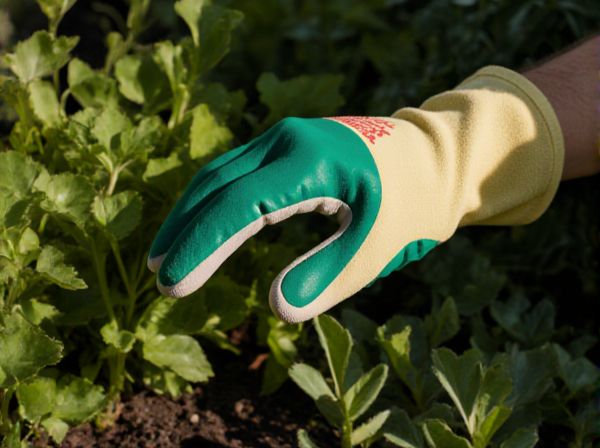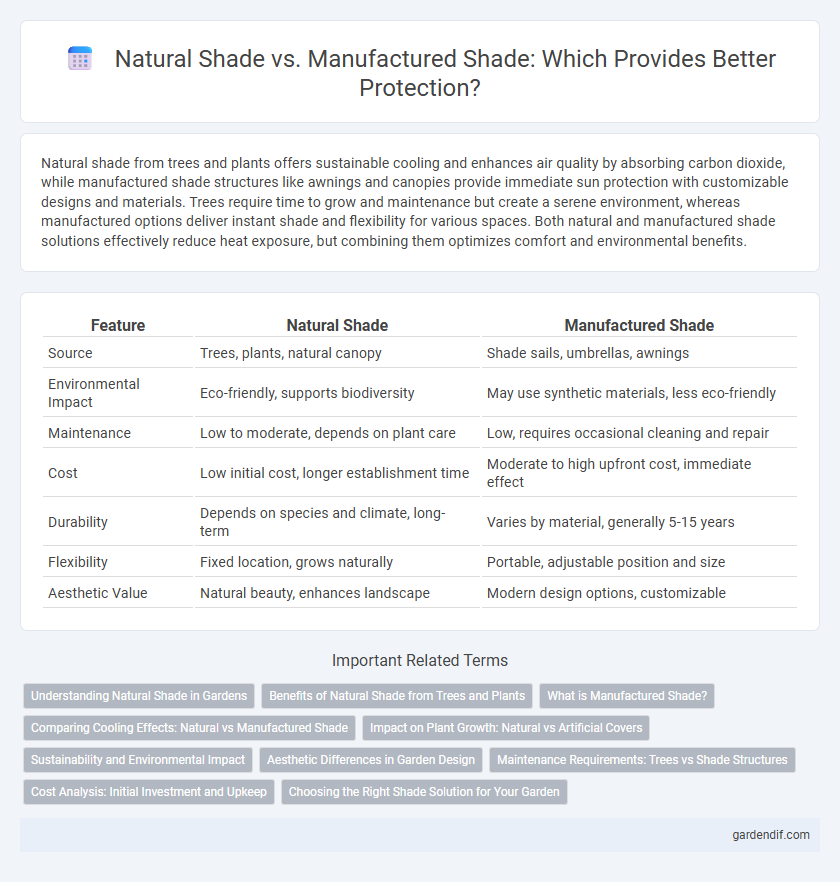
Natural Shade vs Manufactured Shade Illustration
Natural shade from trees and plants offers sustainable cooling and enhances air quality by absorbing carbon dioxide, while manufactured shade structures like awnings and canopies provide immediate sun protection with customizable designs and materials. Trees require time to grow and maintenance but create a serene environment, whereas manufactured options deliver instant shade and flexibility for various spaces. Both natural and manufactured shade solutions effectively reduce heat exposure, but combining them optimizes comfort and environmental benefits.
Table of Comparison
| Feature | Natural Shade | Manufactured Shade |
|---|---|---|
| Source | Trees, plants, natural canopy | Shade sails, umbrellas, awnings |
| Environmental Impact | Eco-friendly, supports biodiversity | May use synthetic materials, less eco-friendly |
| Maintenance | Low to moderate, depends on plant care | Low, requires occasional cleaning and repair |
| Cost | Low initial cost, longer establishment time | Moderate to high upfront cost, immediate effect |
| Durability | Depends on species and climate, long-term | Varies by material, generally 5-15 years |
| Flexibility | Fixed location, grows naturally | Portable, adjustable position and size |
| Aesthetic Value | Natural beauty, enhances landscape | Modern design options, customizable |
Understanding Natural Shade in Gardens
Natural shade in gardens is created by trees, shrubs, and climbing plants that provide a cooling canopy through their leaves and branches, enhancing local microclimates. This organic cover supports biodiversity, improves soil quality, and reduces the need for artificial cooling methods. Using natural shade promotes sustainable gardening by conserving water and reducing energy consumption.
Benefits of Natural Shade from Trees and Plants
Natural shade provided by trees and plants offers significant benefits including temperature regulation through evapotranspiration, which cools surrounding air more effectively than manufactured shade structures. This type of shade enhances air quality by filtering pollutants and produces oxygen, contributing to environmental health and well-being. Furthermore, natural shade supports biodiversity by creating habitats for various species and promotes soil stability, reducing erosion compared to artificial covers.
What is Manufactured Shade?
Manufactured shade refers to artificial structures or materials designed to provide protection from sunlight, including awnings, pergolas, shade sails, and umbrellas. These products utilize durable fabrics, metal frames, or synthetic materials engineered to block UV rays and reduce heat exposure effectively. Manufactured shade offers customizable solutions suitable for various outdoor environments, ensuring consistent sun protection throughout the day.
Comparing Cooling Effects: Natural vs Manufactured Shade
Natural shade from trees provides superior cooling effects by blocking sunlight and releasing moisture through transpiration, which lowers ambient temperatures significantly. Manufactured shade structures, such as awnings and canopies, primarily reduce heat by blocking direct sunlight but lack the evaporative cooling benefits inherent to natural shade. Studies show areas under tree shade can be up to 10degF cooler compared to only 3-5degF cooling achieved by manufactured shading solutions.
Impact on Plant Growth: Natural vs Artificial Covers
Natural shade from trees and shrubs provides a balanced light spectrum essential for photosynthesis, fostering healthier and more robust plant growth. Manufactured shade structures, often made from materials like polyethylene or metal, can reduce light intensity but may alter light quality, potentially affecting plant development and stress responses. Studies show that plants under natural shade exhibit improved growth rates and resilience compared to those under artificial covers, which sometimes create less favorable microclimates.
Sustainability and Environmental Impact
Natural shade, provided by trees and vegetation, enhances sustainability by improving air quality, reducing urban heat islands, and supporting biodiversity without energy consumption. Manufactured shade structures, often made from synthetic materials like metal and plastic, require significant resources for production and maintenance, leading to higher carbon footprints and potential waste issues. Prioritizing natural shade promotes long-term environmental benefits and conservation efforts, whereas manufactured options might offer flexibility but at the cost of increased ecological impact.
Aesthetic Differences in Garden Design
Natural shade in garden design offers organic shapes, irregular patterns, and a dynamic play of light and shadow created by trees and shrubs, enhancing the garden's authentic and serene atmosphere. Manufactured shade structures such as pergolas, awnings, and shade sails introduce precise lines, uniform coverage, and customizable colors, contributing to a modern, structured aesthetic. The choice between natural and manufactured shade significantly impacts the garden's visual texture, ambiance, and architectural harmony.
Maintenance Requirements: Trees vs Shade Structures
Natural shade from trees requires regular pruning, watering, and pest control to maintain healthy growth and effective coverage. Manufactured shade structures demand periodic inspections, cleaning, and occasional repairs to address wear and weather damage. Trees offer environmental benefits like air purification, while shade structures provide consistent shade with less biological maintenance.
Cost Analysis: Initial Investment and Upkeep
Natural shade from trees requires a higher initial time investment for growth but incurs minimal ongoing costs, relying on natural maintenance and organic growth cycles. Manufactured shade structures, such as pergolas or canopies, demand significant upfront expenses for materials and installation, with ongoing upkeep costs including repairs, cleaning, and potential replacements. Evaluating cost efficiency depends on factors like climate, property size, and desired shade duration.
Choosing the Right Shade Solution for Your Garden
Natural shade from trees and shrubs enhances garden aesthetics while providing ecological benefits like habitat for wildlife and improved air quality. Manufactured shade options, such as pergolas, shade sails, and retractable awnings, offer customizable coverage and durability, ideal for precise sun protection and modern design preferences. Choosing the right shade solution depends on your garden's space, climate, maintenance capacity, and whether you prioritize natural ambiance or flexible, engineered shading systems.
Natural Shade vs Manufactured Shade Infographic

 gardendif.com
gardendif.com